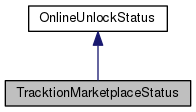An implementation of the OnlineUnlockStatus class which talks to the Tracktion Marketplace server.
More...
#include <juce_TracktionMarketplaceStatus.h>
An implementation of the OnlineUnlockStatus class which talks to the Tracktion Marketplace server.
For details about how to use this class, see the docs for the base class: OnlineUnlockStatus. Basically, you need to inherit from it, and implement all the pure virtual methods to tell it about your product.
- See also
- OnlineUnlockStatus, OnlineUnlockForm, KeyGeneration
◆ TracktionMarketplaceStatus()
| TracktionMarketplaceStatus::TracktionMarketplaceStatus |
( |
| ) |
|
◆ applyKeyFile()
| bool OnlineUnlockStatus::applyKeyFile |
( |
String |
keyFileContent | ) |
|
|
inherited |
Attempts to perform an unlock using a block of key-file data provided.
You may wish to use this as a way of allowing a user to unlock your app by drag-and-dropping a file containing the key data, or by letting them select such a file. This is often needed for allowing registration on machines without internet access.
◆ attemptWebserverUnlock()
Contacts the webserver and attempts to perform a registration with the given user details.
The return value will either be a success, or a failure with an error message from the server, so you should show this message to your user.
Because this method blocks while it contacts the server, you must run it on a background thread, not on the message thread. For an easier way to create a GUI to do the unlocking, see OnlineUnlockForm.
◆ doesProductIDMatch()
| bool TracktionMarketplaceStatus::doesProductIDMatch |
( |
const String & |
returnedIDFromServer | ) |
|
|
overridevirtual |
◆ getExpiryTime()
| Time OnlineUnlockStatus::getExpiryTime |
( |
| ) |
const |
|
inlineinherited |
Returns the Time when the keyfile expires.
If a the key file obtained has an expiry time, isUnlocked will return false and this will return a non-zero time. The interpretation of this is up to your app but could be used for subscription based models or trial periods.
◆ getLocalMachineIDs()
| virtual StringArray OnlineUnlockStatus::getLocalMachineIDs |
( |
| ) |
|
|
virtualinherited |
Returns a list of strings, any of which should be unique to this physical computer.
When testing whether the user is allowed to use the product on this machine, this list of tokens is compared to the ones that were stored on the webserver.
The default implementation of this method will simply call MachineIDUtilities::getLocalMachineIDs(), which provides a default version of this functionality.
◆ getProductID()
| virtual String OnlineUnlockStatus::getProductID |
( |
| ) |
|
|
pure virtualinherited |
This must return your product's ID, as allocated by the store.
◆ getPublicKey()
| virtual RSAKey OnlineUnlockStatus::getPublicKey |
( |
| ) |
|
|
pure virtualinherited |
This must return the RSA public key for authenticating responses from the server for this app.
You can get this key from your marketplace account page.
◆ getServerAuthenticationURL()
| URL TracktionMarketplaceStatus::getServerAuthenticationURL |
( |
| ) |
|
|
overridevirtual |
◆ getState()
| virtual String OnlineUnlockStatus::getState |
( |
| ) |
|
|
pure virtualinherited |
This method must retrieve the last state that was provided by the saveState method.
On first-run, it should just return an empty string.
◆ getUserEmail()
| String OnlineUnlockStatus::getUserEmail |
( |
| ) |
const |
|
inherited |
Returns the user's email address if known.
◆ getWebsiteName()
| String TracktionMarketplaceStatus::getWebsiteName |
( |
| ) |
|
|
overridevirtual |
◆ isUnlocked()
| var OnlineUnlockStatus::isUnlocked |
( |
| ) |
const |
|
inlineinherited |
Returns true if the product has been successfully authorised for this machine.
The reason it returns a variant rather than a bool is just to make it marginally more tedious for crackers to work around. Hopefully if this method gets inlined they'll need to hack all the places where you call it, rather than just the function itself.
Bear in mind that each place where you check this return value will need to be changed by a cracker in order to unlock your app, so the more places you call this method, the more hassle it will be for them to find and crack them all.
◆ load()
| void OnlineUnlockStatus::load |
( |
| ) |
|
|
inherited |
Attempts to load the status from the state retrieved by getState().
Call this somewhere in your app's startup code.
◆ readReplyFromWebserver()
| String TracktionMarketplaceStatus::readReplyFromWebserver |
( |
const String & |
email, |
|
|
const String & |
password |
|
) |
| |
|
overridevirtual |
◆ save()
| void OnlineUnlockStatus::save |
( |
| ) |
|
|
inherited |
Triggers a call to saveState which you can use to store the current unlock status in your app's settings.
◆ saveState()
| virtual void OnlineUnlockStatus::saveState |
( |
const String & |
| ) |
|
|
pure virtualinherited |
This method must store the given string somewhere in your app's persistent properties, so it can be retrieved later by getState().
◆ setUserEmail()
| void OnlineUnlockStatus::setUserEmail |
( |
const String & |
usernameOrEmail | ) |
|
|
inherited |
Optionally allows the app to provide the user's email address if it is known.
You don't need to call this, but if you do it may save the user typing it in.
The documentation for this class was generated from the following file:

